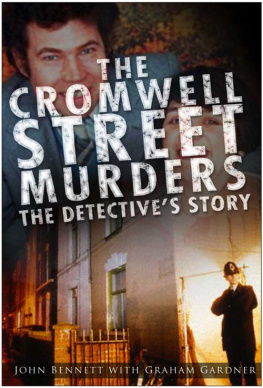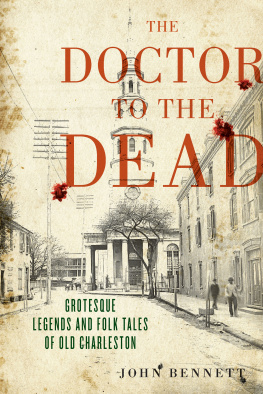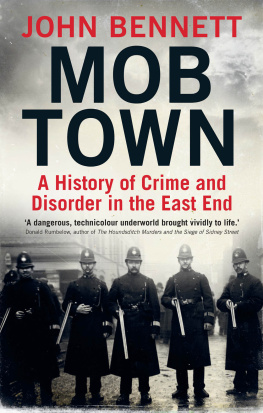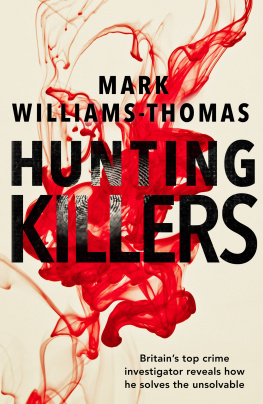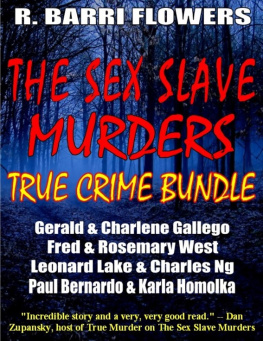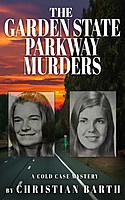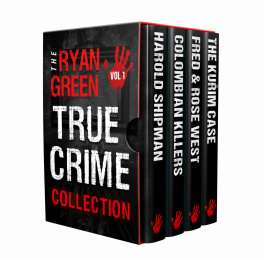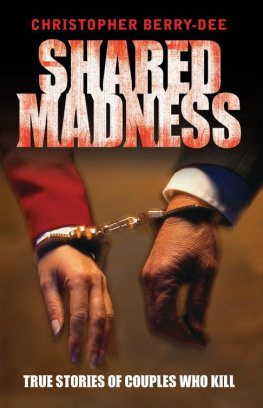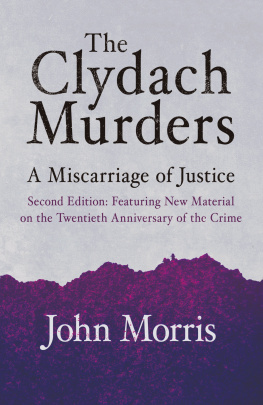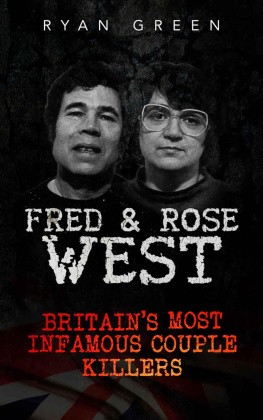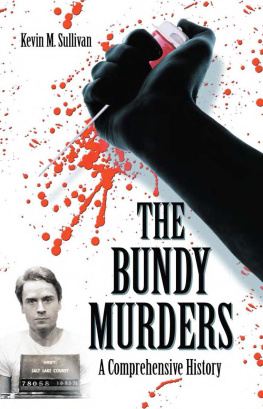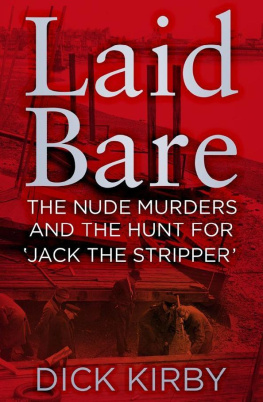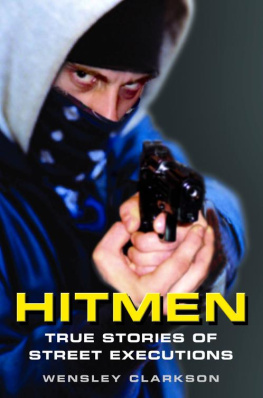THE
CROMWELL
STREET
MURDERS
THE
CROMWELL
STREET
MURDERS
THE DETECTIVES STORY
JOHN BENNETT
WITH
GRAHAM GARDNER
THE HISTORY PRESS
First published in 2005
The History Press
The Mill, Brimscombe Port
Stroud, Gloucestershire, GL 5 2 QG
www.thehistorypress.co.uk
This ebook edition first published in 2011
All rights reserved
John Bennett with Graham Gardner, 2005, 2011
The right of John Bennett and Graham Gardner, to be identified as the Authors of this work has been asserted in accordance with the Copyrights, Designs and Patents Act 1988.
This ebook is copyright material and must not be copied, reproduced, transferred, distributed, leased, licensed or publicly performed or used in any way except as specifically permitted in writing by the publishers, as allowed under the terms and conditions under which it was purchased or as strictly permitted by applicable copyright law. Any unauthorised distribution or use of this text may be a direct infringement of the authors and publishers rights, and those responsible may be liable in law accordingly.
EPUB ISBN 978 0 7524 7137 2
MOBI ISBN 978 0 7524 7138 9
Original typesetting by The History Press
CONTENTS
PREFACE
In the years since those cold, dark days of February 1994, much has been said and written about Fred and Rose West and their despicable crimes. Some of it has come from people who knew them well, including members of their own family, the rest from others further removed. Some accounts were well researched and informed, others less so, but nearly all included considerable speculation about the extent and nature of the crimes the couple were involved in and as the dreadfulness of what took place at 25 Cromwell Street over more than twenty years became apparent, it was equally clear the Wests would secure their own place in the black museum of British crime.
Since then, I have been asked many times to give my side of the story, to correct the inaccuracies of other versions and commit to print a true account of what really took place. Although I could see some merit in doing so, I shunned all previous advances partly because as the Senior Investigating Officer I felt it a chapter best left to rest and partly because I did not want to experience again the media attention I felt such a project would attract.
So why the change of heart? And why now?
Perhaps naively, I thought the publics interest in the West Inquiry would diminish over time. In fact, every conceivable anniversary of the investigation and the events associated with it has brought fresh approaches from news organisations, whether to comment on, correct or put into context what had been said, written or reported by others. I hope this book will answer any future questions. Furthermore, I have also come to appreciate that not all senior investigating officers, and especially those involved in the more high-profile investigations, enjoy the same level of support afforded to me by my chief officers and that the rigours and challenges of real police investigations, let alone those with all the twists, turns and complexities of the Cromwell Street Inquiry, are rarely depicted to the public, for never was the expression that truth is stranger than fiction more apt than here.
Let me be clear, this is not another book about Fred and Rose West, though they are obviously key elements. It is rather an attempt to document what I and my family experienced as well as other officers on the case and especially the courageous people who gave evidence, also the members of the organisations that became involved in the battle to bring the Wests to justice. It is hoped that now their true effort and commitment will be better understood and appreciated, and that the record finally will be put straight concerning an investigation that owed its outcome to so many and from which many lessons have been learned. Who knows, perhaps this will be of some help to anyone unfortunate enough to go through a similar experience.
While I have been faithful to the truth and to make this as accurate an account as possible, I have tried not to betray the confidence entrusted in me, particularly by the families of the victims. They will forever remain uppermost in my thoughts. Neither would this book have been completed without the encouragement and support of Gloucestershires current Chief Constable Dr Tim Brain, his Deputy Craig Mackay, former Gloucestershire County Council and Gloucestershire Constabulary solicitor Richard Cawdron and especially the assistance of Inspector David Griffiths, for which I express my sincere thanks.
I would also like to thank Graham Gardner who, since joining me in this endeavour, has worked tirelessly alongside me throughout the past twenty months and to Sutton Publishing, and especially Christopher Feeney, for considering the final work worthy of publication.
Finally, and most of all, I must thank my wife and family for their never-ending understanding and uncomplaining support throughout my career and into my retirement, which has always meant so much to me.
John W. Bennett QPM
August 2005
ONE
The unmistakable stench of death hung heavy in the air.
Not the customary mix of bone and rotting flesh. The gut-wrenchingly distinctive smell rooted several feet beneath the surface was the result of decomposed flesh and body fat coming into contact with water, and there was plenty of that, either from the broken sewer main or the natural water-table.
Senior Investigating Officer Detective Superintendent John Bennett recognised it straightaway. Fourteen years as a police frogman had honed his senses.
He had sampled it the first time as a fledgling police cadet in Stroud.
A suicide on the main rail line to London. Body parts, not found for a week or so, strewn along a quarter-mile stretch, were collected in the paper bags that were all they had in those days and stored in the boot of the patrol car. By the time the coroner and then an undertaker had arrived the bags had all but disintegrated.
Youd better get used to it, the Sergeant told the raw recruit.
Thirty-two years later in that dingy back garden, the Sergeants words came back to him. He knew there were human remains somewhere. He could smell them. Not for nothing was it said in the force he had missed his vocation, that he should have been a scenes of crime officer, a mortician, a pathologist or even a doctor. Dead bodies, human biology and forensic science had always fascinated him, unlike most other policemen for whom attending a post-mortem examination was little more than one step along the investigative highway an important step, but not one to linger over and certainly not to dwell on.
Often as not, though, it was a duty and sometimes a requirement for identification purposes for police to attend before, during or after a post-mortem. Most did what they had to do and left the rest to a scenes of crime officer, the exhibits officer, senior investigating officer or deputy. Not so John Bennett, or JB as he was widely known. JB loved this side of the job and given the chance would be at the pathologists side from the first incision to the last. Throughout his career, right from seeing that first death on the railway line, the way the body worked and the clues it offered up in death intrigued him.
Though just why John Bennett was there anyway was a curiosity. Some might call it destiny.
Promoted Superintendent Subdivisional Commander in 1989, he thought his return to uniform after more than twenty-two years meant the end of his days as a detective. Not many were given the opportunity to flit from plain clothes to uniform then back again, certainly not when theyd been in the job as long as he had. Whats more, hed enjoyed his time in charge of the Gloucester City Subdivision. It had given him responsibility for all aspects of policing the city rather than just focusing on crime as a detective, and everyone agreed hed done a good job, but the opportunity to return to CID was too good to turn down and in any case, a detective was all he ever wanted to be. Now, after more than three decades in the job, he was at the peak of his powers. Whats more, given his interest in forensic science, fate could hardly have chosen a better man to take charge of what lay ahead, for this was some time before DNA had assumed the importance it has now and if dead bodies could provide a clue to their killer he had always been prepared to exploit any advantage on offer.

